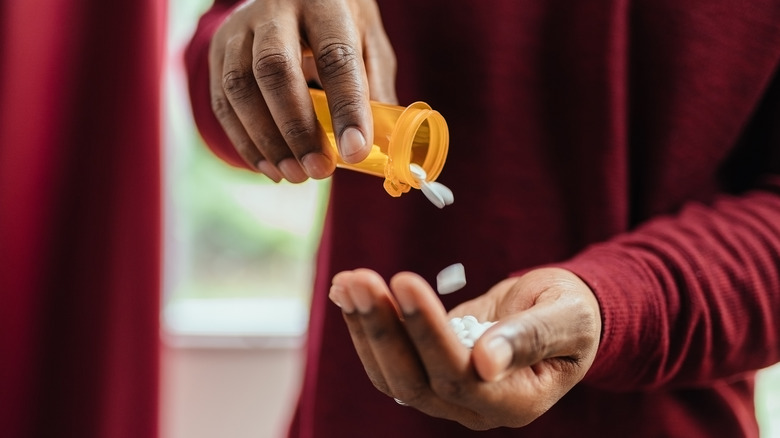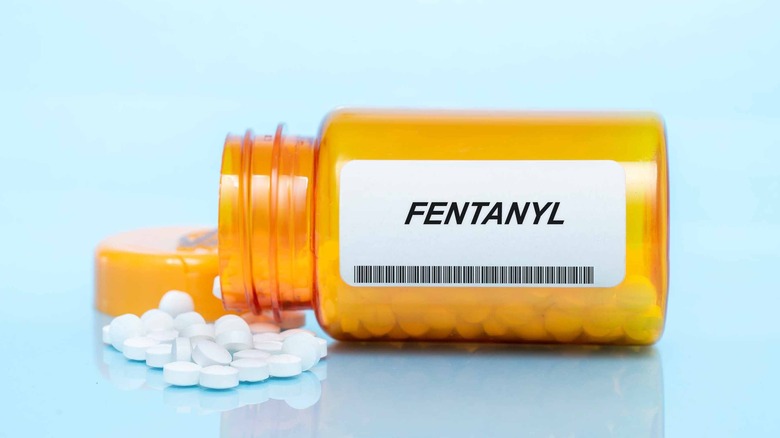Can You Overdose Just By Touching Fentanyl? A Substance Use Expert Weighs In
Whether in large or small doses, synthetic opioids are responsible for 150 deaths daily across the country, including fentanyl, reports the U.S. Centers for Disease Control and Prevention (CDC). Often made in pill form, Health Digest spoke with Megan Tangradi, MS, LPC, LCADC, CCS, CCTP, and clinical director at Achieve Wellness & Recovery to find out if there are other ways fentanyl can put one at risk for overdose other than through oral consumption. Specifically, can one overdose on fentanyl through physical contact with the drug?
"Fentanyl is considered dangerous because it is an extremely powerful synthetic opioid drug," Tangradi states. "It is up to 100 times more potent than morphine and other prescription opioids like oxycodone." Tangradi goes on to explain the many ways in which the drug impacts the body. "Fentanyl also has a much higher potential for overdose and death due to its strength and the way it affects the body — quickly entering the bloodstream and disrupting normal brain chemistry, leading to a dangerously high level of opioids in the body," she says. "This can cause respiratory depression, which is when breathing slows down or stops completely. Fentanyl use also comes with other risks such as addiction, increased risk of overdose if taken with other drugs, and potential for abuse."
What signs can indicate a fentanyl overdose?
Tangradi goes on to tell Health Digest that fentanyl poses an increased risk for abuse due to the fact that it's not subject to the same regulations as other drugs. "Because fentanyl is a synthetic drug, it may not have gone through the same safety testing and regulation that other medications go through, which increases its potential for abuse and misuse," Tangradi says.
Additionally, she outlines what signs one should be on the lookout for in others indicating a possible overdose. "Signs of a fentanyl overdose can include shallow breathing, blue lips or nails, confusion and disorientation, loss of consciousness, pinpoint pupils, nausea, and vomiting," Tangradi explains. "If someone is exhibiting any of these symptoms, it is important to call 911 immediately," she says. She further adds that one should not leave the individual alone. "It is also important to stay with the person while help is on its way as they may need to be monitored and given treatment," Tangradi states. While intervening, Tangradi also highlights the importance of protecting oneself to avoid accidental consumption of the drug. "Remember to not touch your eyes, mouth, or nose after touching any potentially contaminated surface, because you can possibly ingest fentanyl accidentally and this could eventually lead to overdose and death," she says.
Can someone overdose just by touching fentanyl?
As previously mentioned, Tangradi emphasizes the importance of avoiding contact with one's eyes, nose, or mouth after potential exposure to fentanyl to avoid accidental consumption. But is there a risk of an overdose just from the physical contact itself? "No, it is not possible to overdose just by touching fentanyl," Tangradi clarifies. "This is a dangerous misconception surrounding fentanyl. Misinformation became widespread when the US Drug Enforcement Administration previously issued a statement claiming that fentanyl can be absorbed through the skin, which was immediately proven wrong by medical experts," she explains.
Tangradi further confirms that the risk of overdose is present only in the event of ingestion of the drug, particularly in larger doses. "Even though it is an extremely potent drug, someone would need to ingest a powerful dosage for an overdose to occur," she says. "Still, it is important to remember that fentanyl is still a very dangerous drug and should be handled with caution," she states. To do so, Tangradi advises that individuals practice protective measures following potential exposure. "If you come in contact with the drug or its packaging, it is advisable to wash your hands immediately afterward," she states.



